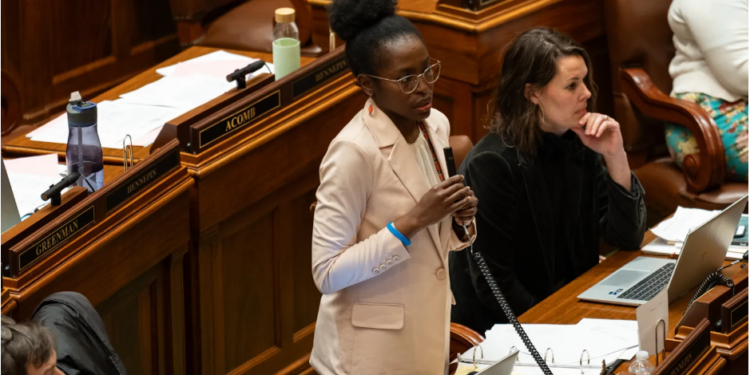Minnesota Representative Esther Agbaje, photographed on April 18, 2024, authored the African American Family Preservation and Child Welfare Disproportionality Act. Photo credit: Aaron Nesheim | Sahan Journal
May 18, 2024 Story by: Editor
After six years of legislative hurdles, a pivotal bill aimed at enhancing protections for families facing separation through the foster care system has finally garnered overwhelming bipartisan support in Minnesota. This legislation, which could set a national precedent, is now on its way to Governor Tim Walz’s desk. According to The Imprint, Walz intends to sign the Minnesota African American Family Preservation and Child Welfare Disproportionality Act into law.
Senate President Bobby Joe Champion of Minneapolis, a key author of the bill, highlighted the systemic issues the law aims to address. “Systematic discrimination and racial disparities in the child welfare system have been separating Black families in Minnesota for decades,” Champion stated. “This law is a major step toward preserving the essential relationships between parents and their children, and keeping siblings in the same household.”
The proposed legislation introduces significant reforms to the foster care system. It moves beyond the vague “reasonable efforts” requirement for child welfare agencies to prevent family separations and ensure reunification, mandating instead a stricter “active efforts” standard. Currently, this higher standard applies only to Native American children under state and federal law.
If enacted, the law will require judges to meticulously review child protective service decisions regarding child removal and elevate the evidence standard needed to substantiate abuse and neglect claims. Additionally, caseworkers will need to involve families in planning social services, considering their social and cultural values, with judicial oversight to ensure adequacy.
State Rep. Esther Agbaje emphasized the bill’s importance during a House session. “Family separation has long been and continues to be a scourge of American society, with families of color especially feeling the brunt of the disruption, trauma, and pain,” she said. “And this bill attempts to address those disparities.
Also read: Uniquely Common: The Cruel Heritage of Separating Families of Color in the United States on Harvard
Governor Walz’s office confirmed his intention to sign the bill if it reaches him, following discussions on SF716’s final language. The Department of Human Services (DHS), responsible for overseeing foster care in Minnesota, also backs the legislation. A DHS spokesperson noted, “DHS remains deeply concerned about the pattern of disproportionate placements for African American children in Minnesota and supports efforts to eliminate those disparities.”
The legislation, which initially focused solely on Black children, has been broadened to include all “African American and disproportionately represented children,” covering almost all children in foster care. The expanded bill addresses children from various overrepresented groups due to race, culture, ethnicity, disability status, or socioeconomic status.
The law, renamed from the Layla Jackson Law to reflect its inclusive language, will start as a pilot program in Ramsey and Hennepin counties in January, with statewide implementation by 2027.
The bill has stirred public debate since its introduction in 2018. Despite concerns from some child welfare agencies and legal experts, bipartisan support has grown. Grand Rapids Republican Rep. Ben Davis, supporting the bill, stated, “Every parent deserves a second, third, or fourth chance,” citing his experience in faith-based counseling.
Experts like Professor Joanna Woolman from the Mitchell Hamline School of Law see this as a significant moment. Woolman said, “The bipartisan support for this — the 120 to zero vote, I mean, I was in tears.”
The legislation parallels the 1978 Indian Child Welfare Act (ICWA), establishing stringent requirements for child removal but goes further by enhancing state petition requirements before terminating parental rights. It also proposes a state-run African-American Child Well-Being Unit and advisory council.
Concerns about the bill’s constitutionality, especially regarding racial distinctions, have been addressed by broadening its scope. Legal expert Walter Olson warned of potential challenges, suggesting that laws distinguishing by race face rigorous scrutiny. However, Professor Woolman noted that the revisions aim to mitigate these risks by encompassing all disproportionately affected groups.
“This bill is a statement about Minnesota’s commitment to disproportionately affected families and African American families,” Woolman explained. “It’s a calculated risk… If there are issues, so be it — they’ll be challenged and dealt with in a different way on a different day.” Source: The Imprint

















